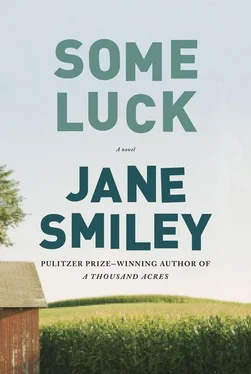They let the unspoken question of a new tractor lie unmentioned on the table.
Joe said, “I can do it. The days are getting longer. Mr. Frederick’s field is flat and has no fence to watch out for. Should be pretty easy.”
In the meantime, Henry was picking the meat off his chicken bones, and Lillian was helping Claire get her peas onto her spoon so she could put them in her mouth. Rosanna was getting up for the pepper, and then peppering her potatoes. It was a family supper; Walter was forty-six years old. Then he looked over at Rosanna, and said, “What day is it?”
Lillian said, “March twe—”
“Oh my goodness, Walter,” said Rosanna. “It’s your birthday! I’m sorry I forgot!”
“I forgot,” said Walter. “Wish it had stayed forgotten.”
“How old are you?” said Henry, and then, when Walter said, “Forty-seven,” Henry looked horrified. Walter said, “Well, Grandpa Wilmer is seventy-four, and Grandpa Otto is seventy-two.”
“Don’t tell them that,” said Rosanna, and Walter laughed. “And they say time passes so slowly on a farm.”
Lillian said, “We don’t have any presents for you, Papa!”
Walter said, “Now’s the time for me to give you presents on my birthday, not the other way around. Let me think.” Walter savored his last bite of mashed potatoes, then said, “I’ll be right back.”
Upstairs, in the cupboard, he had a box of things he had saved as a boy and a young man. He hadn’t looked into it in twenty years or more. Nothing fancy or valuable, but things that had meant something to him at one time. He found it, and found the key, and carried it downstairs without opening it. “I always wondered what was in that,” said Rosanna.
Walter inserted the key in the lock, turned it with some difficulty, and then pulled it out. He lifted the lid. He had forgotten there were so few things in it, but there were enough. He gently tilted the box and let them fall out on the table. Henry got up on his knees, and everyone else leaned forward. With his forefinger, Walter moved the objects apart so that they all could be seen.
The first one he touched was a feather, still surprisingly golden. He said, “This is an oriole feather. Orioles in France were different from orioles in America — brighter. They had a beautiful song. This feather was just lying on the stone railing of a bridge I walked across, and I picked it up.”
He touched a coin. “This is an Indian-head gold dollar. Grandpa Wilmer got it for his twenty-first birthday, and gave it to me when I was born.”
He touched and picked up a tiny withered stem, then brought it to his nose and inhaled the faint but delicious fragrance. He said, “This is a sprig of lavender. I bought it in a market in France.” He held it out to Joey, who took a whiff.
He picked up an envelope and lifted the flap, then pulled out a photograph and handed it to Lillian. As she peered at it, he said, “That’s me at twenty-two, with my buddies in the army. I’m in the middle, with all the hair, and next to me on the left is Herb Andronico, who was killed about two months later, and on the right is Norm Ansgar, who died in the flu epidemic.”
Lillian said, “You were the only one who lived?”
“Of the three of us, yes. That’s why I saved the picture.”
Lillian passed the picture to Rosanna, who held it up in the light from the window. She said, “You never talked about these two.”
“What was there to say?”
The last thing was a tiny handkerchief, clearly not for nose blowing — mostly lace, now yellowed. Walter opened it out. He said, “My great-grandmother Etta Cheek made that, back in England, when she was a girl. Oh, that would have been around 1830.”
Now they all looked at the five objects for a few moments, and Walter said, “Joey?” He thought Joey would take the dollar, but Joey took the sprig of lavender. “Lillian?” He thought Lillian would take the handkerchief, but she took the feather. “Henry?” Henry took the gold coin and rubbed it on his shirt. Walter picked up the photograph, and Rosanna said, “I would like to save that for Frank.” Walter handed it to her. Then he set Claire on his knee, pointed to the handkerchief, and said, “There’s a present for you on the table, Claire. It’s very old. I am going to write a note to you all about it, and keep it for you. Would you like that?”
Claire nodded and laid her head against the base of his neck. Rosanna said, “I’ll bake you a cake tomorrow, Walter.”
Walter didn’t care about that. But he felt Claire in his lap, pressed against his side, and he looked at the two dark heads and the two bright heads, and then at Rosanna. He sensed the knowledge pass between them that the years represented by these lost objects did not have to end as they had. If he’d fallen in the well, for example, Rosanna would have found the box, wondered what all of these things meant, and never known. A shiver passed over him, and then he saw the same shiver pass over Rosanna. They smiled to one another — a rare occurrence these days.
FRANK WAS SUPPOSED to be in the Corps of Engineers — that’s what most of the other soldiers did at Fort Leonard Wood, which was in a forested, closed-in, hilly area that was not like Illinois and certainly not like Iowa. It was green and hot, and there was hardly ever a breeze. Frank’s drill sergeant, a man from Texas, had some different ideas from the others, and he got the recruits to play a little game. The game started simply — he took a mess kit, opened it up, and then threw a handful of coins into the dish. After giving the soldiers a minute to look at the coins, he closed the mess kit and asked what was in there. It was easy. Frank knew the first time — four pennies, a nickel, two dimes, and a quarter — and he knew the second time — six pennies, four dimes, two nickels, and two quarters. The second time, he had thirty seconds. After that, the sergeant used other bits and pieces, not coins: Six pebbles, four leaves, and three acorns. Eight kernels of corn, three dried beans, the two acorns again, and four maple seeds. Five.22 shells and three.30 shells. This was not something that Frank had to learn, it was something that he already knew how to do. From what? From counting cows and sheep? From scouting for rabbits? From shooting squirrels? From leaving a trail of corn kernels for the pheasants?
The next thing was that Frank and another kid — Lyman Hill, from Oklahoma — were given better rifles, new semiautomatic MK 1s. Frank had heard of them, but never seen one. They were nice — well balanced, solid in the hand, with very long barrels. With the rifles, which belonged not to them but to the U.S. Army, they were given target practice. Frank was good — he hit the bull’s-eyes every time out to five hundred yards, so far that he could really only see the corners of the target, until they were given better sights, sights so finely ground that he could see the bull’s-eyes again. But Lyman was better. Lyman could estimate the wind speed and direction, and adjust his shot accordingly. He hit the bull’s-eye at seven hundred yards every time.
After a week of target practice, the sergeant was excited, and took them to the lieutenant. The lieutenant was new on the job — he had graduated early from West Point after Pearl Harbor was bombed, and he was just four months older than Frank (though Lyman was nineteen and looked sixteen — he had never in his whole life eaten as well as he ate in the army, and after two months, he had already grown an inch). The sergeant wanted to send Frank and Lyman to Ohio, to Camp Perry, for sniper training, and then ship them to Africa — the Seventh Army was headed for Africa, to fight Rommel, and snipers were going. The lieutenant wasn’t sure. But, then, the lieutenant wasn’t terribly sure of anything, except what the sergeant, who’d been in the army for nineteen years and would have retired if it hadn’t been for the declaration of war, told him to be sure of. They were standing in the lieutenant’s office, and the sergeant stepped up to Frank and spun him around so that he was facing out the window. Then he said, “Private Langdon. Did you get a look at Lieutenant Jorgenson’s desk?”
Читать дальше












